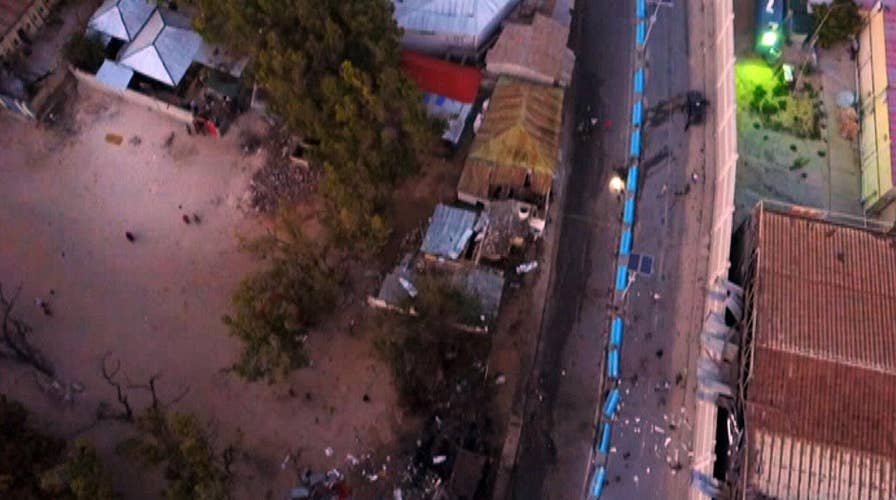Drone footage of aftermath of car bomb attack in Mogadishu
Raw video from May 24 over the Somali capital; video courtesy of Brett Velicovich
It all started at Baledogle, the old Soviet airport 70 miles northwest of Mogadishu, Somalia’s capital, where the U.S. runs a deeply clandestine drone operation with around 30 to 40 American personnel. While shrouded in secrecy, Baledogle has reportedly grown over the years into a key point for training Somali commandos and, early last month, for launching a joint strike against al-Shabab.
The radical Islamist group grew out of the splintered factions of Sharia-based courts that filled the vacuum of authority after a U.S.-led coalition withdrew from the country in the early 90s. Today, al-Shabab sees itself as the preeminent terror force in Somalia with global ambitions.
“These folks are honing their skills in a local conflict that is part of a global war they are waging against the United States,” said Katherine Zimmerman, an expert on Al Qaeda at the American Enterprise Institute.
Al-Shabab regularly attacks foreigners, including aid workers and Somalis, as it wages an insurgent fight against the U.S.-leaning government. Indeed, the country’s new president spent much of his professional life working for the government of Buffalo, New York.
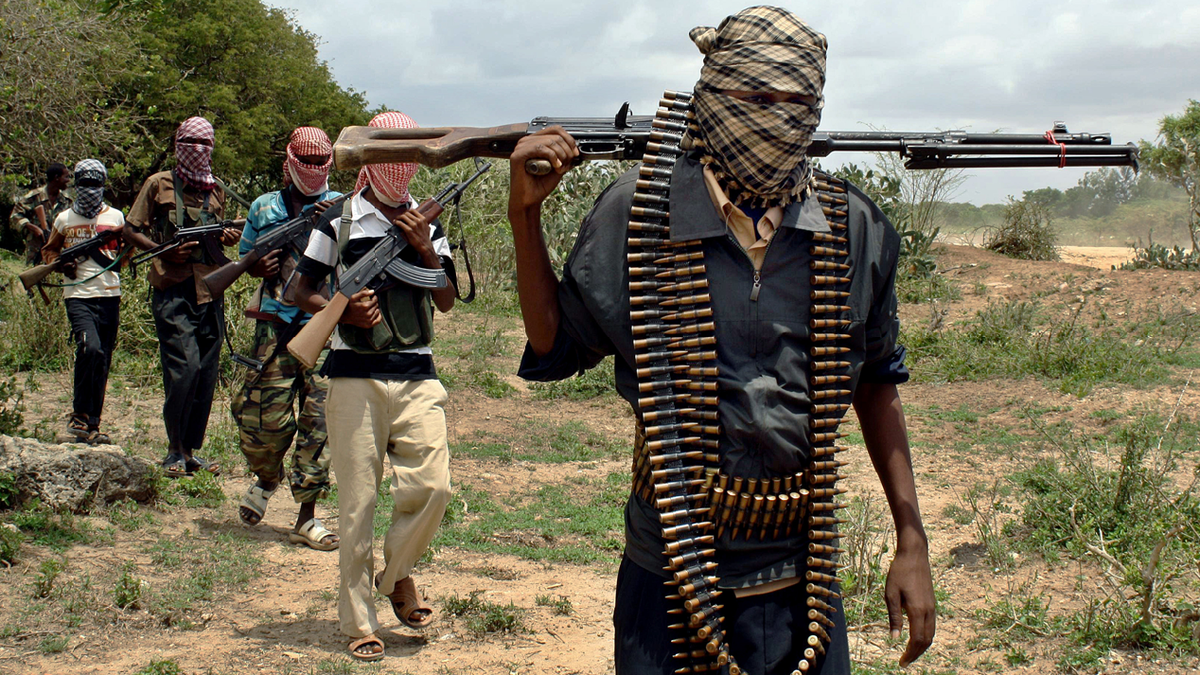
Al-Shabab fighters in Somalia, where the Trump administration has broadened its terror fight. (AP Photo, File)
When the team of Navy SEALS boarded the helicopters at Baledogle, they were technically going in on an “advise and assist” mission to help Somalia’s Danab commando team raid an al-Shabab radio station in a farm village 40 miles west of Mogadishu, where they grow pawpaw and large banana crops. But the station, Andalus Radio, broadcasts Islamist propaganda in a war that is very much over the hearts and minds of a people torn by decades of war, and facing a potentially devastating famine after years of drought.
TRUMP OKS RAMPED-UP AIRSTRIKES AGAINST AL-SHABAAB IN SOMALIA
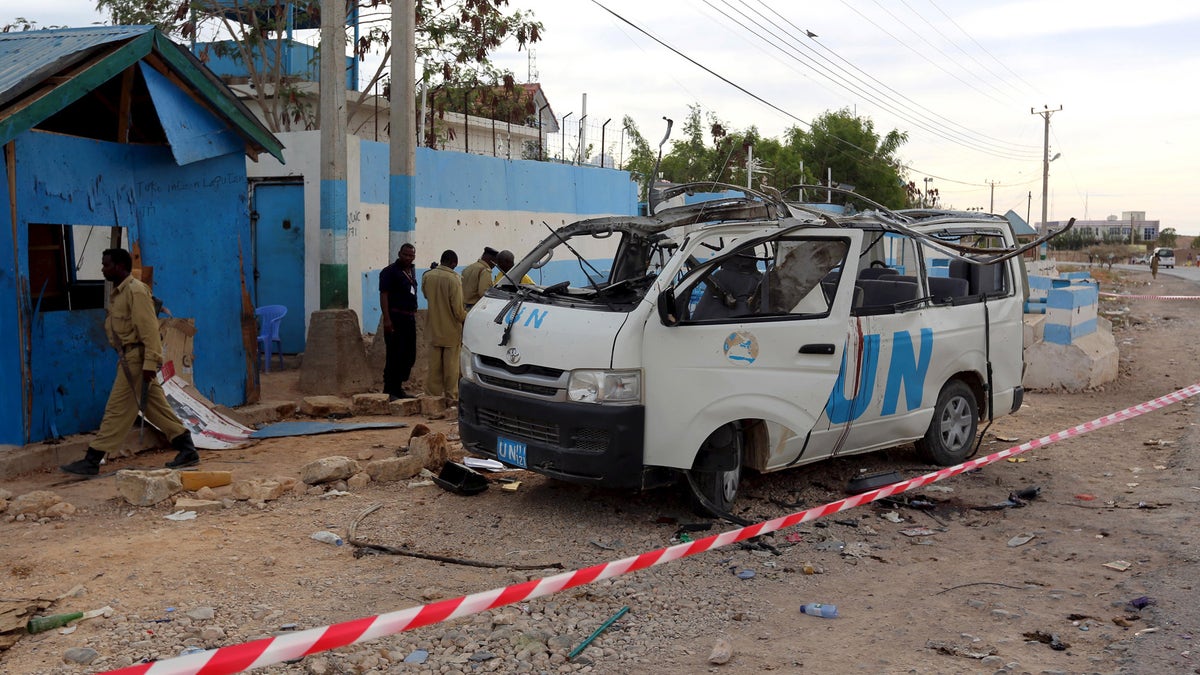
A U.N. van is seen damaged by an improvised explosive device (IED) outside the U.N. compound in Garowe, the administrative capital of Somalia's semi-autonomous Puntland, April 20, 2015. (Reuters)
Al-Shabab attacks against foreign aid workers have soared in the past few years. Just a couple of weeks before the May 4th raid, al-Shabab claimed responsibility for bombing a United Nations vehicle in which six people were killed, including four who were working for the international children’s agency, UNICEF.
The helicopters dropped the Somali commandos and SEALS off at a nearby village and they went on foot to their objective. But there was another Somali unit sent to help as well, a small ground force from the town of Afgoye, according to a Somali official interviewed by Voice of America radio.
The Pentagon has revealed few details, but piecing together witness reports and official Somali communications, it appears that as the force neared the radio station under the cover of darkness, it was met by intense fire. The Somali official told Voice of America that al-Shabab brought in reinforcements and encircled the approaching commandos.
Al-Shabab later claimed it had been tipped off. It’s unclear if that was actually the case, as the Pentagon would not comment. Pictures purportedly taken by Andalus Radio in the aftermath of the battle and viewed by Fox News showed pools of blood on the ground, pressure bandages, a boot and tactical glove, and U.S. military equipment.
Navy SEAL Kyle Milliken was killed, and two others were wounded. Navy SEAL Scott Taylor, now retired and a Republican congressman from Virginia, got a text message before the news went public about the loss of his friend and teammate. They had served together in Iraq.
“I’ve known him and his family very well. He’s got two kids,” Taylor told Fox News, “Kyle was a stellar operator. Very smart, witty and funny. Hard not to like.”
Milliken was the first U.S. service member to die in Somalia since the 1993 U.S. Army mission to capture a warlord led to the deaths of 19 U.S. Rangers and Delta Force special operators, two UH-60 Blackhawk helicopters shot down – and the end of the international mission in Somalia. Years of anarchy were followed by the ascent of radical Islam.
DEATH TOLL JUMPS TO 28 IN AL-SHABAB HOTEL SIEGE, CAR BOMBING
The U.S. said the May raid was nevertheless a success because it “resulted in the death of three al-Shabab operatives, including Moalin Osman Abdi Badi,” a regional leader of the terror group. Somali officials said they seized radio station equipment.
For the Trump Administration, the operation was part of a renewed push in the region to establish footholds of stability where radical Islamist terrorism cannot flourish.
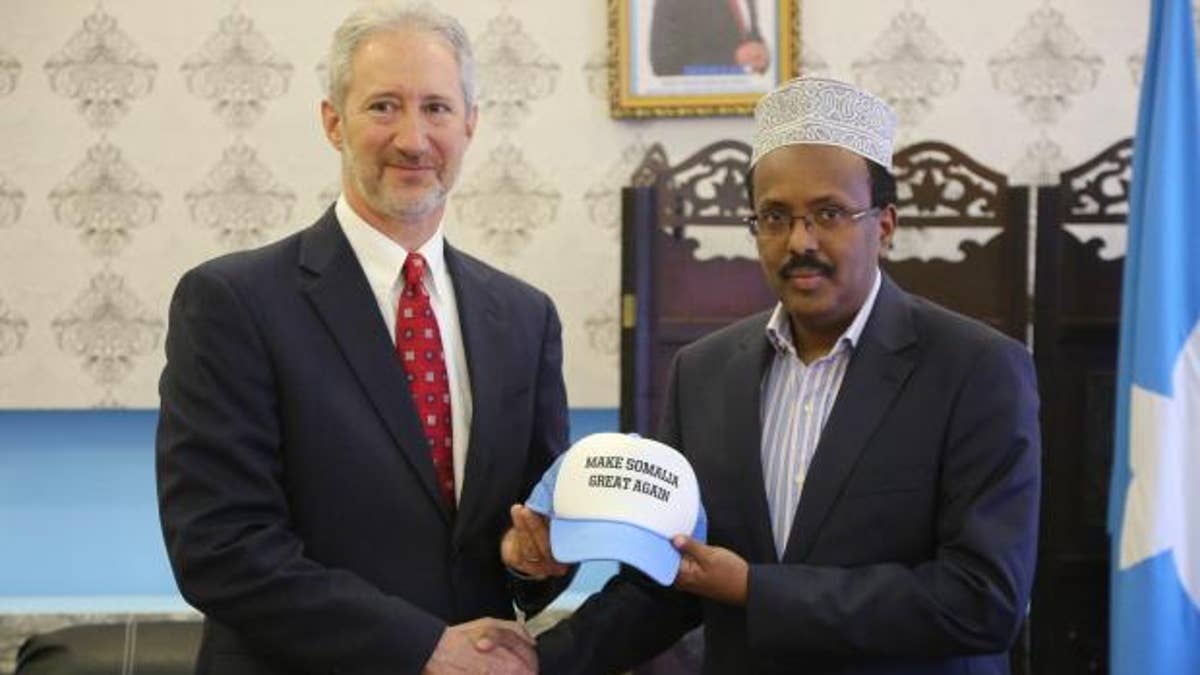
Stephen Schwartz, the U.S. ambassador in Somalia, giving the Somali president a "Make Somalia Great Again" hat. (US Mission in Somalia)
“We’ve increased our humanitarian assistance in response to the severity of the drought, we’re maintaining our development programs, and moving ahead with building out our diplomatic platforms,” Stephen Schwartz, the U.S. ambassador to Somalia, told Fox News.
Schwartz, an Obama appointee, gave new Somali President Mohamed Abdullahi Mohamed a hat when he won election this year. It said “Make Somalia Great Again.”
The Somali President still owns property in the Buffalo area, near where Schwartz grew up.
“It’s a big advantage to analyzing situations and seeing other ways to address them,” Schwartz said.
President Trump was widely criticized when he proposed banning visas from seven Muslim-majority nations. But Somalia's government was more diplomatic. Schwartz said Mohamed was receptive to new vetting requirements, like biometric identification and even taking in deported Somalis, which has increased under the Trump Administration.
“Somalia used to be uncooperative and now they’ve shifted and they are being cooperative. We’re establishing a new equilibrium which will work better for both countries,” Schwartz said.
Schwartz spoke to Fox News from his home in Nairobi, Kenya. Sources say the U.S. government monitors how many employees it has in Mogadishu, the capital, at any given time to limit casualties in the event of an attack. Schwartz described Mogadishu as a “fairly normal city with a lot of car bombs,” about one a week. But “it’s not the mayhem portrayed in [the 2001 blockbuster] ‘Blackhawk Down.’ It has regained a sense of normalcy. There really is a yearning for an end to the conflict.”
The problem is that al-Shabab is increasing the complexity of its attacks. Shortly after Brett Velicovich, a U.S. Army veteran turned entrepreneur, arrived in Mogadishu last month, there was a car bombing nearby.
“What’s most concerning to me is al-Shabab’s ability to get their hands on material that can be stuffed in electronics like iPhones or laptops,” he told Fox News from Magadishu. “Used to be you could see a suicide vehicle packed full of explosives coming for miles.”
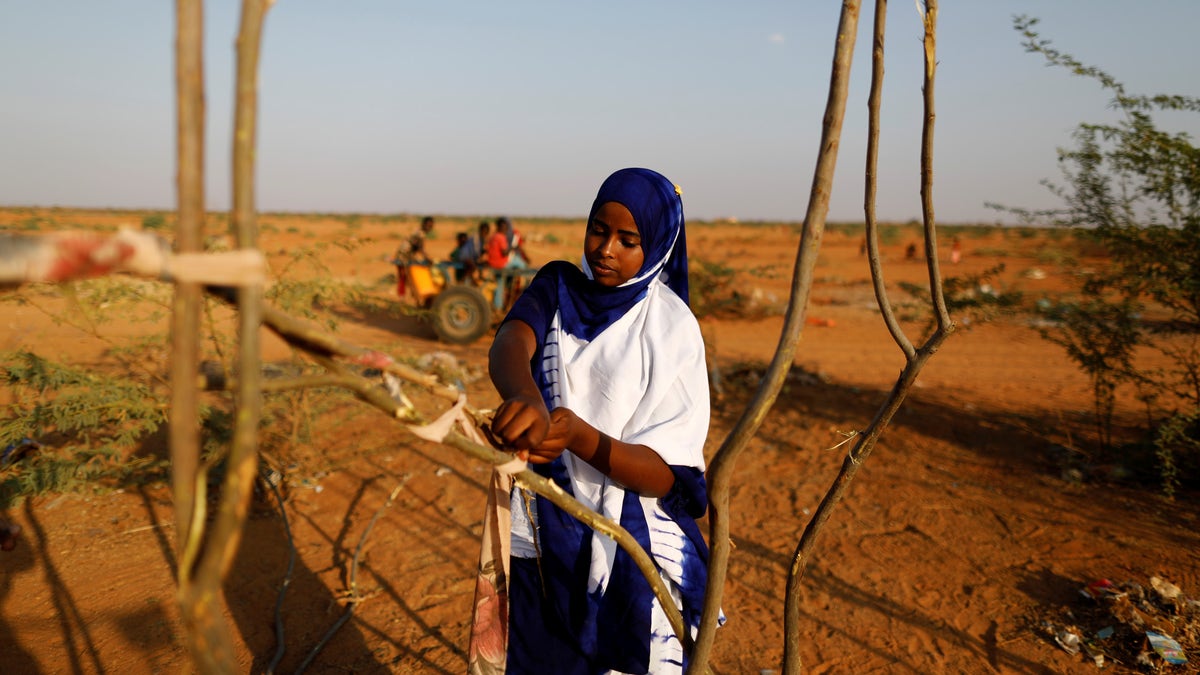
Zeinab, 14, helps her mother and sister build a new shelter at a camp for internally displaced people from drought hit areas in Dollow, Somalia April 2, 2017. (Reuters)
Now, he said, al-Shabab hides the explosives “creatively” to get through the numerous security checkpoints in the city.
A stark threat from Mother Nature is deeply complicating efforts to secure Somalia. The years-long drought affecting East Africa has not been officially declared a famine, but the U.S. military sees the crisis in starkly strategic terms for its hopes for success in the region.
“That famine for the brand new president and this fledgling national government is the biggest thing on their plate,” said Marine Gen. Thomas Waldhauser, head of U.S. Africa Command (AFRICOM). “They have to do well in this 'cause if they can't provide for this famine then Somalia, which has been without a national government for over 20 years, [the Somali people are] gonna question the purpose” of that new government.
US SERVICE MEMBER KILLED IN OPERATION AGAINST AL-SHABAAB IN SOMALIA
Critics of American strategy in Somalia, and by extension all of Africa, worry that the U.S. is relying too heavily on inexperienced or corruptible military partners in the fight against radical Islamist groups like al-Shabab, or Boko Haram and Al Qaeda in the Maghreb (AQIM) further west.
“You can watch in Mali and Somalia, the local militaries have swept through populated areas and cleared them,” said Katherine Zimmerman of the American Enterprise Institute. “We’ve been a little bit blind to the methods that the governments have been using to fight these groups. For example, the methods that the Nigerian government used to fight Boko Haram stoked the insurgency.”
While it’s unclear if al-Shabab was indeed tipped off by U.S.’ Somali allies in the May 4 raid, experts like Zimmerman believe such incidents show a real weakness in the strategy.
“We’ve convinced ourselves that working by and through a partner is going to solve the problem,” she told Fox News. “But in many cases, it’s making the problem we’re trying to solve worse.”
President Trump, who was elected partly for resisting foreign entanglements requiring large numbers of American troops, is nevertheless putting the highest ranking members of his administration in charge of finding a solution for Somalia.
On May 11, Defense Secretary Jim Mattis and Under Secretary of State Thomas Shannon attended a conference in London aimed at figuring out how to solve the Somali problem, militarily and diplomatically. The plan they worked out “includes on the security side both a continued maturation of their security forces in the defenses against al-Shabab, but it also includes a reconciliation program designed to pull the fence-sitters and the middle-of-the-roaders away from al-Shabab,” Mattis said.
“Our intent is to train and assist the African armies as much as possible, let them have the lead in fighting radical Islamist terrorists,” retired four-star Army Gen. Jack Keane.
It’s a high-risk strategy that is still taking shape, and while the bulk of the resources are focused on East African countries like Somalia, the U.S. military is committing troops across the African continent. Every official who spoke with Fox News emphasized that the objective is to help African nations protect themselves. “African solutions for African problems,” said an AFRICOM spokesman.
For example, Velicovich’s company, Expert Drones, is training a select group of Somalis to fly the small remote-controlled aircraft.
“They were all vetted heavily by the State Department because we all had some concerns about this going in,” Velicovich said, “I’m confident they will be used in the right way. They are not like other countries telling the U.S. ‘we don't need your help’, they are actually calling in the best of the best to help them reform and make sure they're country is moving in the right direction.”
While Velicovich and others work to enhance the capabilities of the Somalis, it does not appear that the commanders have used their new authority to conduct precision strikes, despite pushing hard for years for that authority.
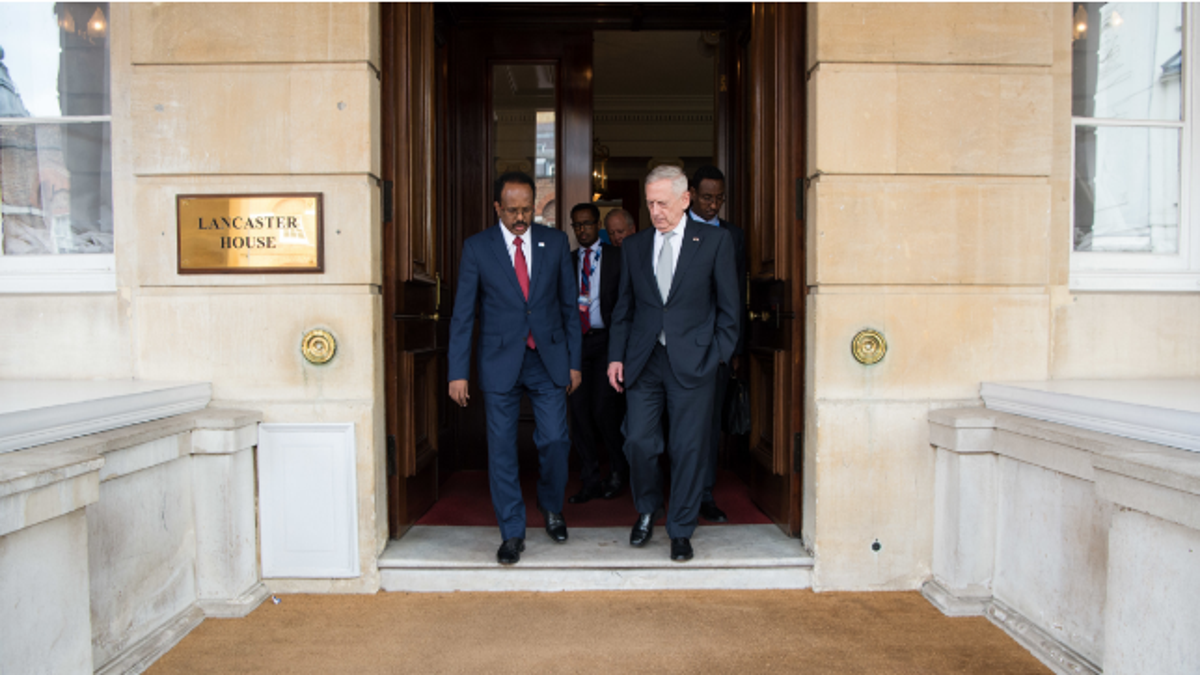
Defense Secretary Jim Mattis with the Somali president at a May 11 conference in London. (Staff Sgt. Jette Carr/DoD)
While former President Obama began the African troop build-up, it came after his top commanders realized mistakes had been made. And, experts say, Obama resisted the recommendations from his generals when it came to figuring out how to solve the problem.
U.S. officials admitted in 2012 that the rise of Islamist groups in Africa, such as Al Qaeda in the Maghreb (AQIM), which operates in West Africa, had caught them flat-footed. In July 2012, AFRICOM’s commander said that AQIM had become a “much more difficult” threat. “We missed an opportunity to deal with AQIM when they were weak,” U.S. Army Gen. Carter Ham said at the time.
The Obama Administration was divided at the time over how to tackle the rising threat. “Do we or don’t we” deploy drones, was a big part of the conversation as late as 2012, according to the Washington Post.
While former President Obama’s National Security Adviser Ben Rhodes gradually ramped up Special Forces and drones in Africa, he kept a close lid on their ability to make tactical decisions on when and where to strike, over fear of civilian casualties. “This was the Ben Rhodes machine. They did not trust the military to make these tactical decisions on their own in places like Somalia so it was very carefully managed,” said one source with knowledge of the inner workings of the Obama White House.
Keane said Trump has given U.S. operational commanders considerable more authority.
“He has decided to leave the employment of the force up to the discretion of the commanders,” he said. “Not up to Washington.”
An order signed by Trump in late March allows the military to conduct precision airstrikes in support of partner forces in a designated southern part of the country, deemed an area of active hostilities. It is valid only until late September.
But a Fox News investigation has found that the new military authority has rarely been used since the May 4 raid, if at all. And time is running out.
AFRICOM won’t say why, but it does point to complications from the drought. “International organizations on the ground, people moving and seeking relief, they are all part of the common operating picture and they make our job more difficult,” said an AFRICOM spokesman.
“We’re looking to do more. We’re not not trying. We’re absolutely being vigilant,” Schwartz told Fox News, “I think we’re trying to do the right thing in a very measured way.”
Experts say the focus now seems to be on gaining intel on al-Shabab and other groups, in advance of new strikes.
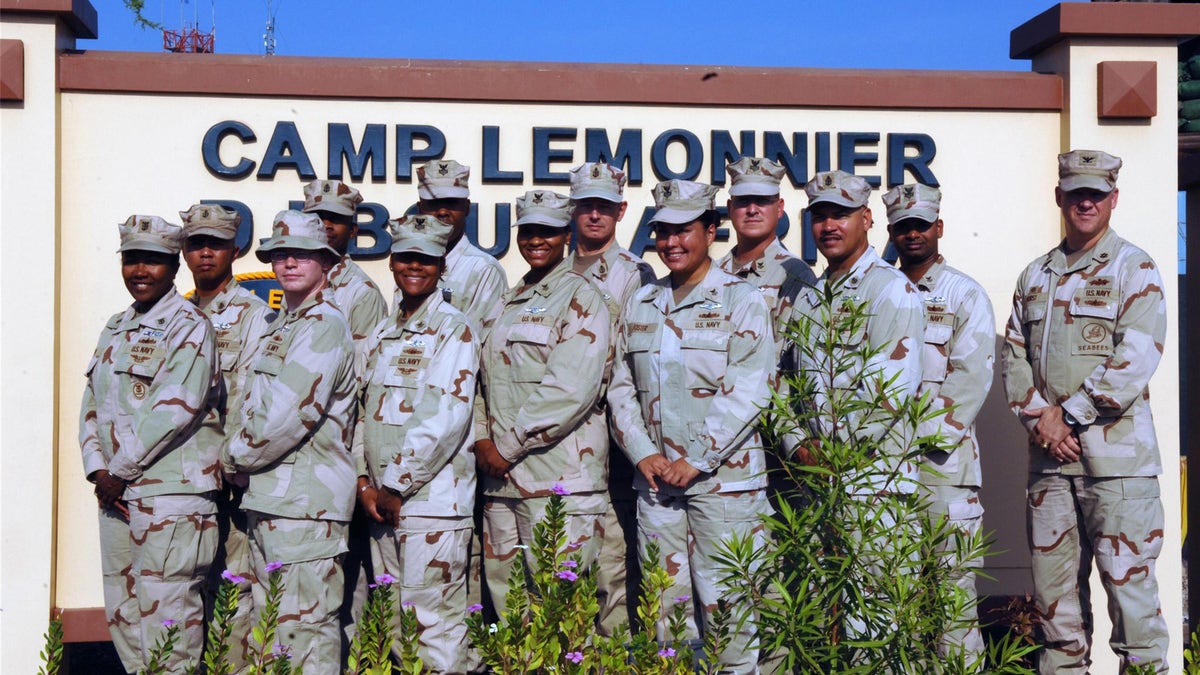
Camp Lemonnier. (US-AFRICOM-Photo)
To that end, there are at least three drone bases in Africa- Djibouti, Cameroon and Niger. There is a suspected base in Tunisia, but that has not been confirmed by the U.S. military.
“Although it's too early to tell if there's a dramatic shift” under the Trump Administration, “recent events point to an increased pace of operations and more permissive rules of engagement for drone operations in Yemen and Somalia. Operations in West Africa do not appear to be affected by the change in administrations as yet,” Dan Gettinger of the Center for the Study of the Drone at Bard College in New York State told Fox News.
AFRICOM tells Fox News at any given time there are approximately 5,000 to 6,000 U.S. personnel on the continent. The bulk of which, 4,000 or so, are based at Camp Lemonnier in Djibouti, which is often a staging ground for operations in both Somalia and Yemen, across the Gulf of Aden.
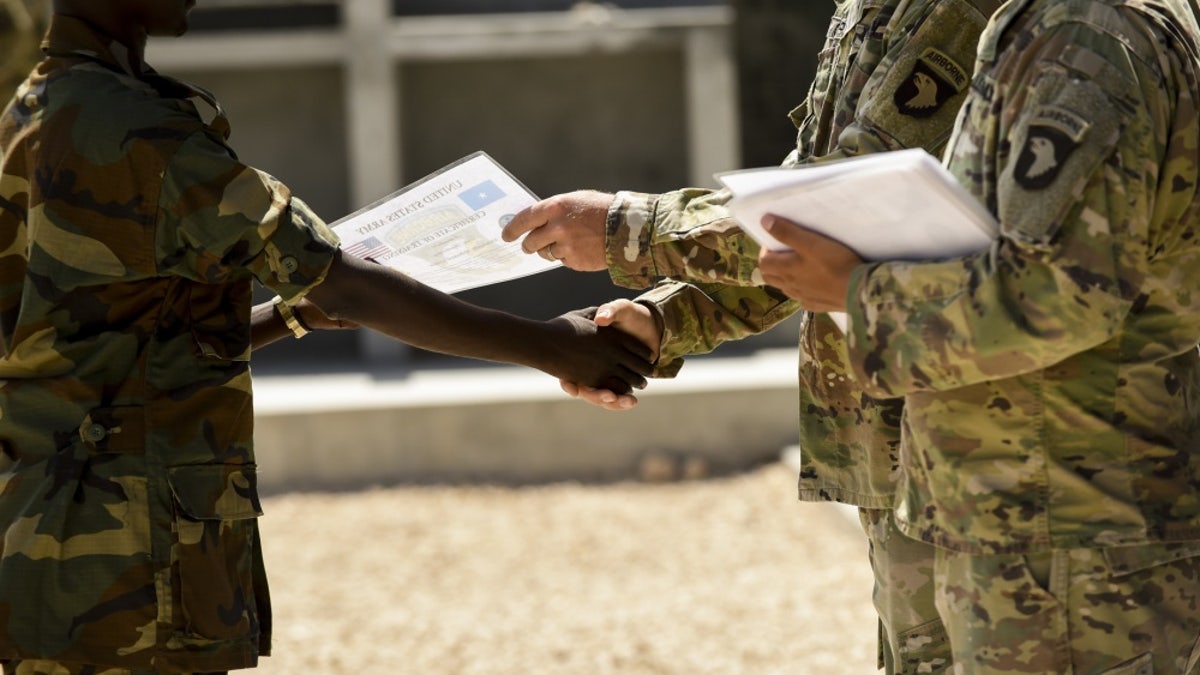
Soldiers from the U.S. Army's 101st Airborne Division present certificates of training completion to Somali National Army soldiers during a graduation ceremony May 24, 2017, in Mogadishu Somalia. (Staff Sgt. Nicholas Byers)
While there are reports of many more bases that are either temporary or staging grounds for equipment, AFRICOM says it maintains “15 enduring locations.” The Pentagon defines an enduring location as characterized “primarily by the sustained presence of allocated U.S. Forces." They span the continent. And some take issue with the idea that U.S. special operators are there in truly “advise and assist” roles, like what happened on May 4 with Milliken.
“There has been an over-reliance on special operations as a force multiplier,” said Taylor, the Virginia congressman and retired SEAL. “The Obama Administration wanted to show there were no boots on the ground…but there were boots on the ground. They would say they were advisers but of course they were there. This administration has changed it a little bit but there is still this overlap.”
AFRICOM insists it’s doing just that, and it points to the thousands of troops deployed against the continent on missions, including Lt. Soule Malame. Reached at Garoua airfield in Cameroon, where the U.S. operates surveillance drones, Malame told Fox News about how he left the West African country of Togo when he was 24 and is now back in Africa working with a unit designed to win hearts and minds.
“The message we’re trying to get across here is: ‘What can we do to provide security for your area? What can we do together?’” Malame said the enemy in the area is Boko Haram, the group that spurred the “Save Our Girls” movement after it kidnapped 276 young women from a Nigerian school in 2014. “They use the religion to serve themselves. They come and say Americans are bad people, not your friend. We want you to join us so you can fight them.”
But Malame says the Cameroon villagers open up to him when they hear his local brand of French and learn that he, like them, is a Muslim.
“Boko Haram and Islamic State of West Africa come looking for money and looking for influence. But they will use the money not to serve God but their own purpose,” he said. “I tell the villagers, they are not Muslims. Muslims will not come and tell them to kill people for no reason, and rape women, and kidnap girls. We, the Americans, are here to help them.”
But it’s a tall order, not least because of the tyranny of distance in Africa, and compounded by our reliance on shaky local governments to finish the job.
But Zimmerman said that even when militant Islamic groups are pushed out, they “return not because of ideological resonance, but because they can deliver basic supplies, and there are governance vacuums.”
It remains to be seen whether the Trump strategy will require more American troops, an increase rather than decrease in humanitarian aid as outlined in his budget, and even greater diplomatic engagement across Africa to complete the mission of preventing terror and stabilizing desperately poor countries. What is clear, is that the president has come a long way from questioning the wisdom of aiding such countries at all, like he seemed to do in a tweet in 2013.
Mattis, his defense secretary, said the U.S. is “accelerating the tempo” in the war on terror. If that is the case, Al-Shabab and the other terror groups are likely to get hit, again.
At his funeral in Norfolk, Virginia late last month, Milliken’s service to his country, and to Africa, was remembered by many. The New England Patriots, his hometown team, delivered a video message. “As Memorial Day weekend approaches,” team owner Bob Kraft said, “we are reminded of the sacrifices made by patriots like Kyle and so many others who have made the ultimate sacrifice to defend and protect our rights as Americans.”
Additional reporting by Kristine Kotta and Georeen Tanner.
